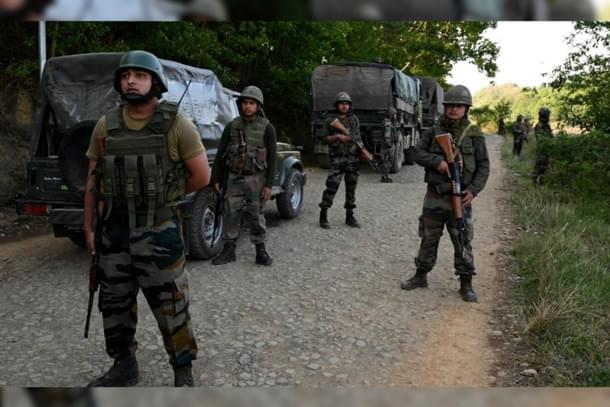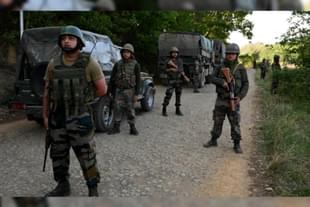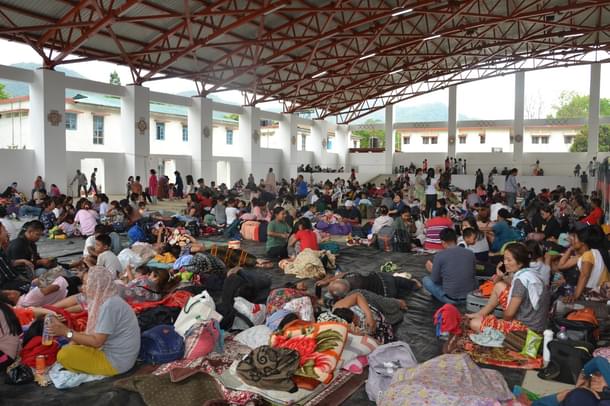Politics
Ground Report: Manipur Ethnic Violence — What Went Wrong And Why
Jaideep Mazumdar
May 09, 2023, 02:59 PM | Updated 02:59 PM IST
Save & read from anywhere!
Bookmark stories for easy access on any device or the Swarajya app.


Trouble-torn Manipur is gingerly limping back to a basic semblance of normalcy now. A fragile normalcy, nonetheless, imposed by a heavy state security apparatus.
The stark extent of the devastation that Manipur and Manipuris have suffered is becoming clear only now as the smoke from the many fires that charred many swathes of the state slowly dissipates to reveal the brutal scars of the violence that hemorrhaged the state last week.
Heart-rending scenes of wailing families lined up outside hospital morgues, the distraught sifting through the scorched remains of their homes with robotic numbness and the displaced, grimly returning to their looted homes — to pick up the remaining threads of life — are commonplace in Manipur today.
And beneath all that human suffering lies one important question: what went wrong and why?

Like everything else in Manipur, the answers to that are nuanced and cloaked in many shades of grey. Because nothing in Manipur has ever existed in uncomplicated black and white.
Manipur has never been completely peaceful with all communities--the majority Meiteis and the tribals (Kukis and Nagas) — living together in harmony. Ethnic clashes and militancy have bled and haunted the state for many decades.
Yes, the guns of militants had fallen silent of late and the perennial ethnic tensions had not claimed lives or limbs in very recent years. But the absence of violence in Manipur has never meant peace.
Apart from ethnic tensions, poor governance, endemic corruption and lopsided development have always been Manipur’s bane. These are the underlying reasons for last week’s violence, even though the immediate triggers were two recent developments.
The Twin Triggers
The deep-seated suspicions and stress between the Meiteis and Kukis was aggravated and brought out in the open by two recent developments.
One was the largescale drive initiated by the state government since February to clear reserve and protected forests from human encroachments in the Kuki-inhabited areas of the hill districts.
The state government notified many forest tracts in the hills as reserve and protected forests and sent eviction notices to a few Kuki villages in February this year.
The eviction drive, which resulted in houses and churches being demolished, created a lot of resentment among the Kukis.
The state government cites statistics to contend that the population of Kukis has registered an exponential and unnatural rise in recent years and as many as a thousand new Kuki villages have come up, most of them in protected forest reserves.
The second trigger was the order by the Manipur High Court asking the state government to submit its recommendation to the Union government on granting Scheduled Tribe (ST) status to the Meitei community.
What Angered The Kukis
The Kukis were upset with the Manipur government over the eviction drive that was carried out amidst allegations that a large number of their fellow-tribesmen from Myanmar had infiltrated illegally into Manipur and settled down in the hills.
The Kukis belong to the larger Chin-Kuki-Zo ethnic group that is spread out over Mizoram, neighbouring areas of Manipur and Sagaing and Chin provinces of Myanmar.
The Kukis refute the allegation that they have sheltered thousands of their fellow tribesmen who have been immigrating illegally into India through the porous and unfenced Indo-Myanmar border.
The Kukis also allege that the government did not follow laid down procedures while notifying hill tracts as reserve and protected forests or waterbodies. The Kukis claim that many of these areas are their community lands over which they had exercised control for generations.
They are also very angry over demolition of churches, along with houses, that had come up in lands under reserve forests and also in anti-encroachment drives in Imphal Valley.
The demand for ST status by Meiteis has also angered Kukis. The Meiteis, who are mostly Vaishnavites, are in a majority and used to be listed as tribals by the British, But they lost the status after the kingdom of Manipur merged with the Indian Union in 1949.
The Kukis argue that Meiteis are educationally, economically and culturally more advanced than the tribals. If they (Meiteis) are granted ST status, they will gobble up all benefits, including reservation in government jobs, meant for tribals.
The Meiteis, contend the Kukis, already have a lion’s share of government jobs in Manipur and wield a lot of influence and power in the state. Forty of the 60 seats in the state legislative Assembly are occupied by Meiteis.
But more than jobs, it is the fear of losing their lands to Meiteis that agitates the Kukis. Right now Meiteis cannot purchase or own land in the hills; only tribals can do so. But if Meiteis are granted ST status, they will be able to own lands in the hills. The Kukis fear being marginalised in their own lands in the hills.
The Meitei Point Of View
The Meiteis contend that they fulfil all criteria for being classified as tribals. Practising Hinduism should not disqualify them from being recognised as tribals, they say.
Also, is it only fair that the tribal status that they lost when Manipur merged with India in 1949 should be restored to them.
The Meiteis point out that the illegal infiltration of thousands of Kukis from Myanmar into the hills of Manipur is a fact that cannot be denied. Statistics prove this, they say. This illegal immigration has disturbed the delicate demographic balance in the state, thus heightening ethnic tensions.
The ‘foreigners’ (Kukis from Myanmar) have to be evicted from Manipur, say the Meiteis.
The Meiteis also resent the fact that while tribals (Kukis and Nagas) can purchase land and properties in Imphal Valley (the land of the Meiteis), the Meiteis cannot do so in the hills. The tribals, they allege, have been squeezing them out of their homeland (the Imphal Valley).
The Violence
As is well-known by now, a ‘tribal solidarity rally’ organised by the All Tribal Students’ Union of Manipur (ATSUM) Wednesday (3 May) resulted in attacks on Meiteis in the Kuki-dominated Churachandpur district.
That led to retaliation against Kukis in the Imphal Valley. Matters soon spiralled out of control and throughout Wednesday night, the whole of Thursday and till Friday noon, ethnic violence raged on in many parts of the state.
It was only when the Union Government invoked Section 355 of the Constitution to take over law and order responsibilities in the state, deployed a huge number of army, Assam Rifles, CRPF and BSF troops, imposed curfew and issued shoot-at-sight orders that violence ceased.
How The Flare-Up Could Have Been Avoided
Swarajya spoke to prominent members of the Meitei and Kuki communities, top state officials and senior army and Assam Rifles officers, and the broad consensus was that the violence could have been avoided had the state government handled the emerging situation deftly.
One, there was no need for the state to initiate eviction proceedings against Kuki habitations that allegedly encroached on forest lands in a hurry.
There is merit in the contention that proper procedures in notifying lands under reserve or protected forests, or in evicting dwellers from such lands, was not followed by the state government
The state government, especially the political leadership of the state, ought to have initiated discussions with the Kuki leadership and taken them on board.
The government also need not have been ham-handed in carrying out the eviction drive, especially when it came to demolition of churches.
Two, the state’s political leadership, especially Chief Minister N Biren Singh, adopted a rigid stand on the alleged presence of Kukis from Myanmar in Manipur.
He repeatedly stated that an exercise to update the National Register of Citizens (NRC) will be undertaken in the hills to identify and evict Kukis who had infiltrated into Manipur from Myanmar.
For many Kukis, it thus became a matter of survival. The Kuki immigrants from Myanmar feared being deported (to Myanmar) where they would be exposed to attack by the military junta.
The state government ought to have convinced the Kuki political and community leadership, including Kuki civil society, of the need to preserve forests and identify illegal immigrants from Myanmar.
Three, the state government also mishandled the issue of ST status for Meiteis.
Even if the state government was favourably inclined to the Meiteis’ demand — it has, however, been non-committal on the demand for a long time — it should have spoken to the tribals (Kukis and Nagas) and allayed their fears.
The state government ought to have assured the tribals that Meiteis will not eat into the reservations for Kukis and Nagas.
The state government could also have assured the tribals that appropriate legislation will be enacted to protect their (tribal) interests.
The tribals have reasons to harbour resentment against the predominantly Meitei political and administrative leadership of the state. The primary reason for that is the apparent and abysmal neglect of the tribal areas in the hills.
Most development activities of the state are concentrated in the Meiti-dominated Imphal Valley and little of the development pie reaches the hills.
The tribals feel politically disempowered and feel that their destinies are decided by the Meiteis.
Four, Manipur is plagued by endemic corruption. Tribals say that the little amount of funds allocated for development of the tribal areas in the hills gets pocketed by politicians and bureaucrats, and their surrogate contractors.
Once violence broke out, the state government was found to be completely incapable of handling the situation.
Five, the state police is a much reviled force and has gained infamy for being corrupt, undisciplined and partisan.
That is why the Union Government took control of the law and order machinery.
The MHA also appointed former DGP of CRPF, Kuldiep Singh, as security advisor to the state.
That is why the Union Ministry of Home Affairs (MHA) sidelined the incumbent police chief (DGP), a Kuki, and handed overall responsibility of the force to Additional DGP (Intelligence) Ashutosh Sinha.
Singh is now, for all practical purposes, in charge of the law and order machinery in the state.
That the Union Government has no confidence in the abilities and professionalism of the Manipur Police force was evident when it mobilised tens of thousands of army, Assam Rifles, CRPF and BSF soldiers to restore order in the state.
The state of the Manipur Police can be gauged from the fact that (according to the chief minister's own admission) 1,041 rifles and 7,460 rounds of ammunition were looted from police stations and police reserves in the state by rioters.
The police simply fled, leaving behind their weapons, when rioters besieged the police stations. All policemen who violated their primary duty to protect their weapons with their lives will likely go scot free.
So will the rioters who looted the weapons from the police.
The chief minister unabashedly declared amnesty Monday (May 8) for all those who surrender the looted weapons!
The Manipur Police is widely perceived to be a partisan force whose members, especially in the lower ranks, allow community affiliations to dictate their behaviour and conduct.
The state government has been found wanting on many fronts and will face an uphill, if not near-impossible, task of gaining the confidence of Manipuris.





